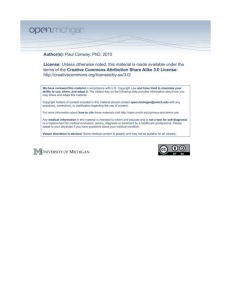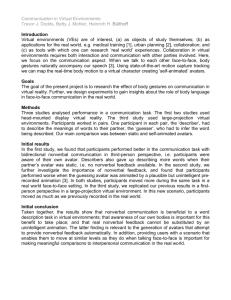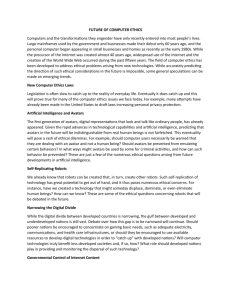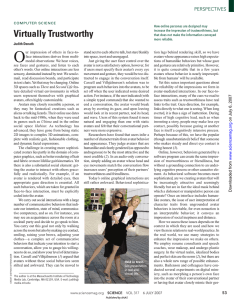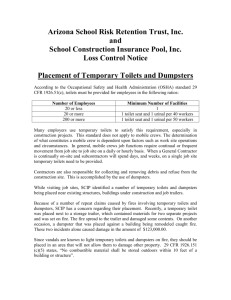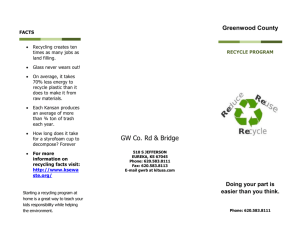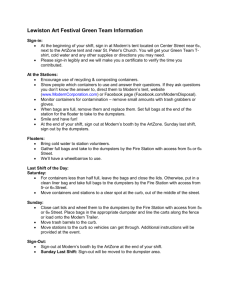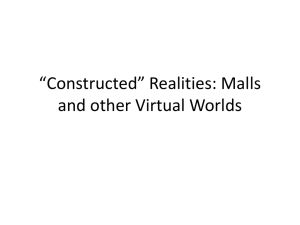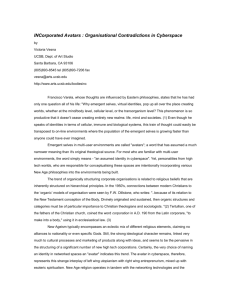Sample 1B final exam prompts
advertisement
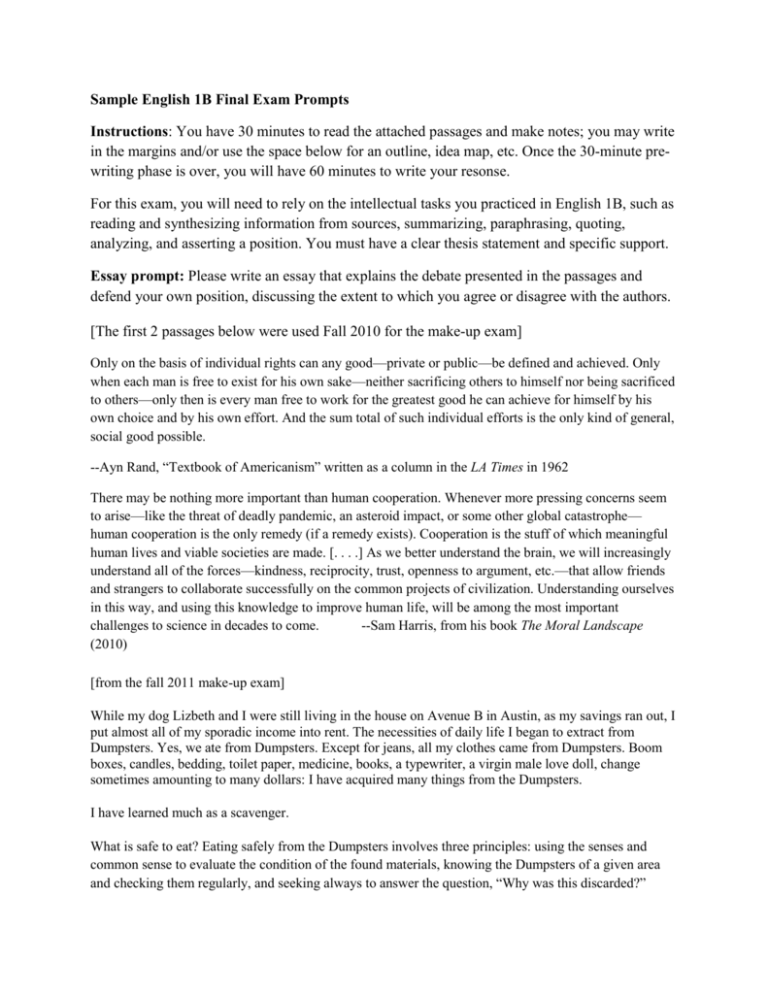
Sample English 1B Final Exam Prompts Instructions: You have 30 minutes to read the attached passages and make notes; you may write in the margins and/or use the space below for an outline, idea map, etc. Once the 30-minute prewriting phase is over, you will have 60 minutes to write your resonse. For this exam, you will need to rely on the intellectual tasks you practiced in English 1B, such as reading and synthesizing information from sources, summarizing, paraphrasing, quoting, analyzing, and asserting a position. You must have a clear thesis statement and specific support. Essay prompt: Please write an essay that explains the debate presented in the passages and defend your own position, discussing the extent to which you agree or disagree with the authors. [The first 2 passages below were used Fall 2010 for the make-up exam] Only on the basis of individual rights can any good—private or public—be defined and achieved. Only when each man is free to exist for his own sake—neither sacrificing others to himself nor being sacrificed to others—only then is every man free to work for the greatest good he can achieve for himself by his own choice and by his own effort. And the sum total of such individual efforts is the only kind of general, social good possible. --Ayn Rand, “Textbook of Americanism” written as a column in the LA Times in 1962 There may be nothing more important than human cooperation. Whenever more pressing concerns seem to arise—like the threat of deadly pandemic, an asteroid impact, or some other global catastrophe— human cooperation is the only remedy (if a remedy exists). Cooperation is the stuff of which meaningful human lives and viable societies are made. [. . . .] As we better understand the brain, we will increasingly understand all of the forces—kindness, reciprocity, trust, openness to argument, etc.—that allow friends and strangers to collaborate successfully on the common projects of civilization. Understanding ourselves in this way, and using this knowledge to improve human life, will be among the most important challenges to science in decades to come. --Sam Harris, from his book The Moral Landscape (2010) [from the fall 2011 make-up exam] While my dog Lizbeth and I were still living in the house on Avenue B in Austin, as my savings ran out, I put almost all of my sporadic income into rent. The necessities of daily life I began to extract from Dumpsters. Yes, we ate from Dumpsters. Except for jeans, all my clothes came from Dumpsters. Boom boxes, candles, bedding, toilet paper, medicine, books, a typewriter, a virgin male love doll, change sometimes amounting to many dollars: I have acquired many things from the Dumpsters. I have learned much as a scavenger. What is safe to eat? Eating safely from the Dumpsters involves three principles: using the senses and common sense to evaluate the condition of the found materials, knowing the Dumpsters of a given area and checking them regularly, and seeking always to answer the question, “Why was this discarded?” I find from the experience of scavenging two rather deep lessons. The first is to take what I can use and let the rest go by.The second lesson is of the transience of material being. This has not quite converted me to a dualist, but it has made some headway in that direction. I do not suppose that ideas are immortal, but certainly mental things are longer-lived than other material things. Once I was the sort of person who invests material objects with sentimental value. Now I no longer have those things, but I have the sentiments yet. Many times in my travels I have lost everything but the clothes I was wearing and Lizbeth. The things I find in Dumpsters, the love letters and ragdolls of so many lives, remind me of this lesson. Now I hardly pick up a thing without envisioning the time I will cast it away. This I think is a healthy state of mind. --Lars Eighner, from the essay “On Dumpster Diving” (1993) What's in a name? What do you make of a passenger vehicle called a Bronco? Or one dubbed a Cherokee? How about a Wrangler? Are they just chrome-plated expressions of sublimated testosterone flooding the highways? Check out the herd that grazes the average car lot these days: Blazer, Tracker, Yukon, Navigator, Tahoe, Range Rover, Explorer, Mountaineer, Denali, Expedition, Discovery, Bravada. Besides signaling that we're not Civic or Gallant, they indicate there's something else going on here. These names are only the end product of the intense buyer-profiling that the car companies and the marketing firms continuously carry out. By the time they make it to the lot, these cars are streamlined Frankensteinian concoctions of our private anxieties and desires. We consumers don't so much shop for one of these SUVs as they shop for us. When GMC decided to launch the Denali (an SUV named for the Alaskan mountain), the auto-trade papers discussed the subtleties of that outdoorsy name: Even though most buyers "will never venture into territory any less trampled than the local country club parking lot," wrote Ward's Auto World, "the important goal of the Denali marketing hype is to plant the image in customers' minds that they can conquer rugged terrain. The metaphor of Alaska is particularly apt because SUVs, especially the larger of the species, depend on the myth that we have new frontiers yet to pave. Perhaps we're trying to tame a different kind of wilderness. Indeed, in an age of gated communities the SUV is the perfect transportation shelter to protect us from fears both real and imagined." It's been said that the most distinctive feature of the American character is that we continually define ourselves as pilgrims facing a new frontier. In their darkest hearts, the members of the new-money bourgeoisie have convinced themselves that we live in an unforgiving wilderness of marauders and brutes. The hidden meaning of our new conveyances can be found right on the surface. Once upon a time, Trailblazers, Explorers, and Trackers tamed the Wild West. Now, through the sorcery of focus groups, the bull-market gentry have brought the Pathfinders and Mountaineers back into their lives in the belief that they need to conquer the savage land one more time. ---from “The Hidden Life of SUVs” by Jack Hitt (1999) published in Mother Jones Avatars are real and are becoming a permanent feature of our lives. They begin to appear in the allegorized names we give ourselves to make our email addresses a bit more desctiptive: weightlifter@hotmail.com, doglover@yahoo.com, englishnerd@gmail.com. They become even more real as we choose a name and a doll-like figure to flit around on wings and meet other fairy-like creatures in Second Life. The pictures we mount on Facebook or mySpace start to live tiny virtual lives of their own as our friends comment on them. The virtual world is becoming every bit as real as the actual world around us. A woman in Texas was prosecuted in Los Angeles for a fake account in the name of “Josh Evans” that she set up on mySpace. She was trying to get back at one of her daughter’s erstwhile friends. State boundaries count for nothing in this world. The woman was prosecuted in Los Angeles because that’s where the mySpace servers are located. The law follows the bits in this case. Where exactly did this fake “Josh Evans” reside? Texas? Los Angeles? In the mind of the poor girl who fell in love with him? Avatars create problems when we fall in love with them and even more problems when they leave us for someone else! Avatars make us both real and unreal. Our power over our own avatars is real only inasmuch as we are able to understand their power over us. Philosophers and economists, statesmen, writers, even poets have written about avatars. Avatars have been lauded and cursed, dreamed of and disdained. Are they a force for good or evil? They can bring stability and instability and make people both love and hate. Avatars are real and they give us a second life. Why should we not desire and help create this extension of ourselves? As Louis XIV might have put it, “On avatar, c’est moi!” (My avatar is myself!) from The Philosophy of Virtual Life by George Skripasis SECOND LIFE by Anne Belmont My avatar, so precious so pretentious, and so unlike me, floats over the windmills of a virtual Kansas plain, her wings stretched as she passes over the waving unreal grain.
